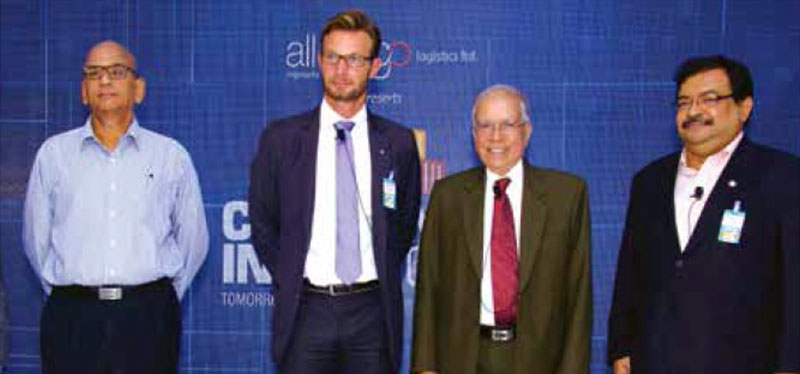[vc_row][vc_column][vc_column_text]
The global container market is still reeling under pressure because of weak demand and a surfeit of large container vessels, Franck Dedenis, Managing Director, Maerskline India Private Limited said at the Containers India conference. Speaking of the container market outlook during the second session he said the first and second quarters of 2016 yielded poor results despite container lines cutting costs, optimising networks and reaping benefits from the fall in bunker fuel price. “The demand for containers remains sluggish. The days of double digit growth are long gone. We now have to aim for simple single digit growth,” he said.
Freight rates have plummeted by 24 per cent and shipping lines are trying to arrest this free fall by increasing the number of vessels scrapped and lowering the order book to make capacity and supply remain at an acceptable level. Dedenis said the best way to respond to such a situation lies in differentiating service offerings. With most lines taking to bigger vessels to gain from economies of scale, the shipping product size and offering remains almost the same. Lines should maximise their ability to adjust to rapid changes in the market situation, he reckoned. He emphasised on the need to automate and include fast, intuitive, self-service applications built for everyday needs that would assure service guarantee. Apps on the high seas and ashore would be required for initiating and managing shipments, viewing and printing the bill of lading and tracing and tracking cargo. “The most important need, however, is to consolidate. EBIDTA levels (earnings) are higher in industries that consolidate,” Dedenis said. But in addition to tweaking service offerings and making available user-friendly apps, it is important that bottlenecks in supply chain be addressed. Inland transportation costs, equipment imbalance, port costs, regulatory issues, long standing containers and relaxation of cabotage are some of the concerns that need immediate resolution for lines to function well in the Indian market.
But despite depressed market conditions the world over, there was an increase in the number of containers handled from 175 million teu last year to 185 million teu this year. Terminal operators in India such as DP World too have seen a six per cent rise in containers handled at their terminals. To be able to maintain these growth numbers, the railways would need to generate greater private investment as it would quicken movement of boxes from factories to CFSs or ports, thereby reducing congestion on the main routes, Kevin D’Souza, Director – Commercial and Business Development, Subcontinent, DP World, said. “Vessel alliances will impact India and bigger vessels need more cranes to discharge cargo,” he said. But to ensure sustainable growth in the ports sector, he emphasised the need for a constant dialogue between stakeholders in the industry, particularly the government, port and terminal operators. The concession agreement needs periodic reviewing and renewal to be able to balance risk and investment to tailor them to macro and micro economic conditions.While container trade expands, the composition of commodity trade contributing to it will vary depending on the domestic demand-supply situation.
Given the current economic and manufacturing scenario in India, there is going to be an increase in commodity imports over the next few years. A lot of commodities that used to be transported as bulk and break bulk cargo are now being containerised. Growers of basmati rice, cotton, oil seeds, sugar, pulses and cashew have taken the box route. “There is a strong possibility that global growth rates keep up their momentum and we see an increase in commodity trade,” said,
G Chandrashekhar, Economic Advisor and Director, IMERTF, Indian Merchant Chambers. Supply chain efficiencies are crucial for container trade and use of digital technology to track movement of boxes is important, he said. The increase in containerisation of commodities in India is also expected to give coastal shipping a big boost.
The keynote session that discussed global and local container market outlook was moderated by Michael P Pinto, Former Secretary, Ministry of Shipping.
[/vc_column_text][/vc_column][/vc_row]






